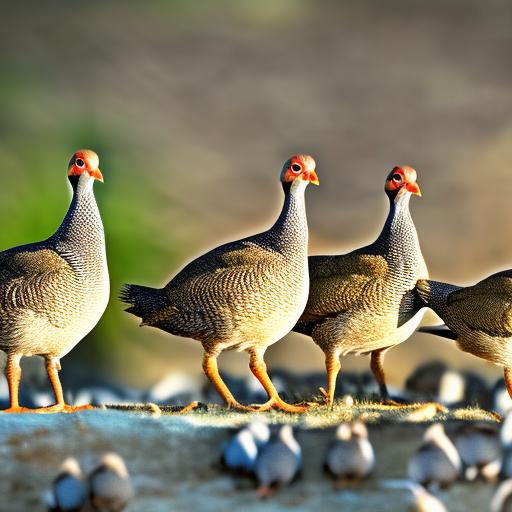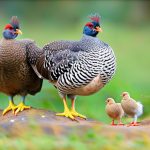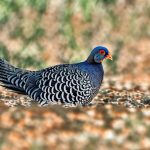When it comes to raising guinea fowl chicks, providing a warm and safe environment is crucial for their health and well-being. To ensure the chicks are comfortable and thriving, it’s important to set up a brooder that is warm, dry, and free from drafts. A brooder can be a simple setup, such as a large cardboard box or a plastic tub, lined with clean bedding such as pine shavings or straw. It’s essential to provide a heat source, such as a heat lamp or a heating pad specifically designed for poultry, to maintain a temperature of around 95-100 degrees Fahrenheit for the first week of the chicks’ lives. The temperature can then be gradually reduced by 5 degrees each week until the chicks are fully feathered.
In addition to warmth, the brooder should also be equipped with a reliable source of clean water and high-quality chick starter feed. The water should be provided in a shallow dish or a specialized chick waterer to prevent drowning, and the feed should be placed in a shallow feeder to make it easily accessible to the chicks. It’s important to keep the brooder clean and dry, as damp bedding can lead to health issues such as respiratory problems and leg deformities. By providing a warm and safe environment for the guinea fowl chicks, you are setting them up for a healthy and successful start to life.
Key Takeaways
- Provide a warm and safe environment for the chicks to thrive
- Ensure proper feeding and watering for the chicks’ growth and development
- Monitor and manage stress levels to promote healthy growth
- Protect the chicks from predators to ensure their safety
- Prevent and treat common health issues to maintain the chicks’ well-being
Feeding and watering the chicks
Feeding and watering the guinea fowl chicks is an essential aspect of their care and development. From the moment they hatch, it’s important to provide them with a high-quality chick starter feed that is specifically formulated to meet their nutritional needs. The feed should contain essential nutrients such as protein, vitamins, and minerals to support healthy growth and development. It’s important to ensure that the feed is fresh and free from mold or contaminants, as these can have detrimental effects on the chicks’ health.
In addition to feed, access to clean water is crucial for the chicks’ well-being. Water should be provided in a shallow dish or a specialized chick waterer to prevent drowning, and it should be changed regularly to ensure it remains clean and free from debris. Proper hydration is essential for the chicks’ overall health and can help prevent issues such as dehydration and heat stress. By providing a balanced diet and access to clean water, you are setting the foundation for the guinea fowl chicks to thrive and grow into healthy adults.
Monitoring and managing stress levels
Monitoring and managing stress levels in guinea fowl chicks is essential for their overall well-being and development. Chicks can experience stress from various factors such as overcrowding, loud noises, sudden changes in environment, or handling. It’s important to observe the chicks regularly for signs of stress, such as excessive vocalization, feather picking, decreased appetite, or lethargy. By being attentive to their behavior, you can identify potential stressors and take steps to address them.
To manage stress levels, it’s important to provide the chicks with adequate space, a clean and comfortable environment, and a consistent routine. Avoid overcrowding the brooder, as this can lead to competition for resources and increased stress levels. Additionally, minimize loud noises and sudden movements around the chicks to create a calm and peaceful environment. Handling should be kept to a minimum, especially during the first few weeks of life when the chicks are most vulnerable. By monitoring and managing stress levels, you can help ensure that the guinea fowl chicks are able to grow and develop without unnecessary setbacks.
Protecting the chicks from predators
Protecting guinea fowl chicks from predators is crucial for their safety and survival. Chicks are particularly vulnerable to predators such as cats, dogs, raccoons, foxes, and birds of prey. To safeguard the chicks from potential threats, it’s important to provide them with a secure and predator-proof enclosure. This can include using hardware cloth or wire mesh to cover windows and openings in the brooder, as well as ensuring that the enclosure is sturdy and well-constructed.
When the chicks are old enough to be moved outdoors, it’s important to provide them with a secure coop or pen that is protected from predators. This can include burying wire mesh around the perimeter of the enclosure to prevent digging predators, installing predator-proof locks on doors and windows, and providing adequate lighting to deter nocturnal predators. Additionally, consider using scare tactics such as motion-activated lights or sound devices to deter potential threats. By taking proactive measures to protect the guinea fowl chicks from predators, you can help ensure their safety and well-being as they grow and mature.
Preventing and treating common health issues
Preventing and treating common health issues in guinea fowl chicks is essential for their overall well-being. Chicks can be susceptible to various health issues such as coccidiosis, respiratory infections, and leg deformities. To prevent these issues, it’s important to provide the chicks with a clean and dry environment, access to fresh water, and a balanced diet. Additionally, consider providing them with access to natural sunlight or a UVB light source to support their immune system and overall health.
In the event that health issues do arise, it’s important to take prompt action to address them. This can include consulting with a veterinarian who is experienced in poultry care to obtain an accurate diagnosis and treatment plan. Additionally, consider implementing preventative measures such as vaccination or supplementation with probiotics to support gut health and immunity. By being proactive in preventing and treating common health issues, you can help ensure that the guinea fowl chicks are able to thrive and grow into healthy adults.
Socializing the chicks with other guinea fowl

Socializing guinea fowl chicks with other members of their species is important for their social development and overall well-being. Chicks raised in isolation may struggle to develop normal social behaviors and may experience increased stress levels. To promote healthy socialization, consider raising multiple chicks together from a young age so they can learn from each other and develop social bonds.
When introducing new chicks to an existing flock of guinea fowl, it’s important to do so gradually to minimize potential conflicts. This can include providing visual barriers such as wire mesh or fencing so that the birds can see each other without direct contact. Additionally, consider providing multiple feeding and watering stations to reduce competition for resources. By promoting positive social interactions among the guinea fowl chicks, you can help ensure that they develop strong social bonds and are able to thrive within their flock.
Gradually introducing the chicks to the outdoors
Gradually introducing guinea fowl chicks to the outdoors is an important step in their development and transition to adult life. When the chicks are around 6-8 weeks old and fully feathered, they can begin spending short periods of time outdoors under supervision. This can help them acclimate to natural light, fresh air, and different environmental stimuli.
When introducing the chicks to the outdoors, it’s important to do so gradually to minimize potential stress and ensure their safety. Start by allowing them access to a secure outdoor pen or run during daylight hours, gradually increasing their time outside as they become more comfortable. It’s important to provide them with access to shade, shelter, and fresh water while outdoors, as well as protection from potential predators. By gradually introducing the guinea fowl chicks to the outdoors, you can help them develop important survival skills and adapt to their natural environment as they mature into adult birds.
In conclusion, raising guinea fowl chicks requires careful attention to their environmental needs, nutrition, health, socialization, and gradual introduction to outdoor living. By providing a warm and safe environment, feeding and watering them properly, monitoring stress levels, protecting them from predators, preventing common health issues, socializing them with other guinea fowl, and gradually introducing them to the outdoors, you can help ensure that they grow into healthy and thriving adult birds. With proper care and attention, guinea fowl chicks can become valuable members of your flock and bring joy and entertainment for years to come.
If you’re looking for tips on how to keep fresh hatched guinea fowl alive, you might also be interested in learning about the best feeding practices for ducks. Poultry Wizard has a helpful article on what you should feed ducks to ensure their health and well-being. Understanding the dietary needs of different poultry can be crucial in raising healthy and thriving birds.
FAQs
What are the basic needs of fresh hatched guinea fowl?
Fresh hatched guinea fowl require warmth, proper nutrition, clean water, and protection from predators to survive and thrive.
How can I provide warmth for fresh hatched guinea fowl?
You can provide warmth for fresh hatched guinea fowl by using a heat lamp or brooder to maintain a temperature of around 95 degrees Fahrenheit for the first week, then gradually decrease the temperature by 5 degrees each week until they are fully feathered.
What should I feed fresh hatched guinea fowl?
Fresh hatched guinea fowl should be fed a high-quality game bird starter feed with at least 24% protein. You can also supplement their diet with finely chopped greens and insects.
How can I ensure fresh hatched guinea fowl have access to clean water?
Provide fresh hatched guinea fowl with clean, shallow water in a small dish or chick waterer. Make sure to change the water regularly to prevent contamination.
How can I protect fresh hatched guinea fowl from predators?
You can protect fresh hatched guinea fowl from predators by keeping them in a secure brooder or coop with a predator-proof mesh or wire. Additionally, provide them with a safe and enclosed outdoor area to explore once they are old enough.
Meet Walter, the feathered-friend fanatic of Florida! Nestled in the sunshine state, Walter struts through life with his feathered companions, clucking his way to happiness. With a coop that’s fancier than a five-star hotel, he’s the Don Juan of the chicken world. When he’s not teaching his hens to do the cha-cha, you’ll find him in a heated debate with his prized rooster, Sir Clucks-a-Lot. Walter’s poultry passion is no yolk; he’s the sunny-side-up guy you never knew you needed in your flock of friends!







